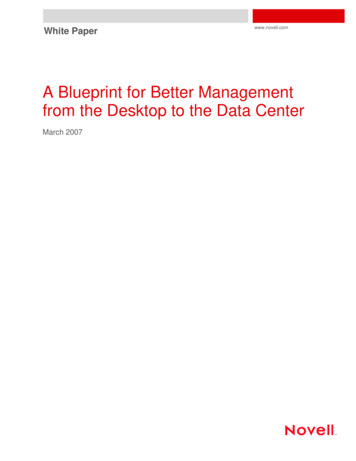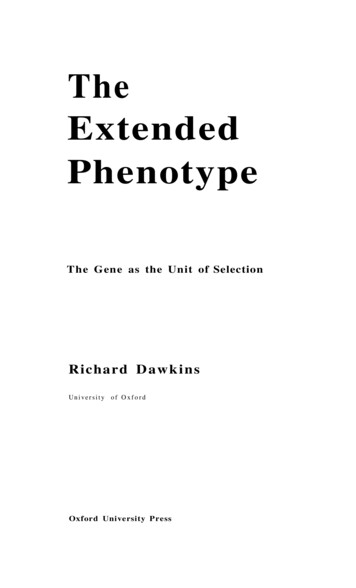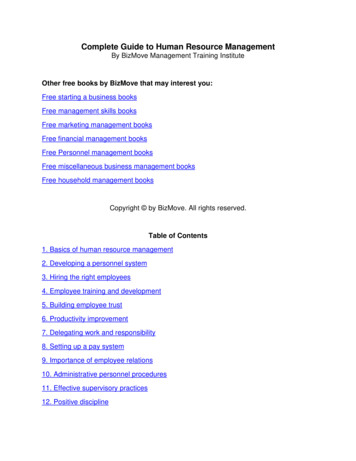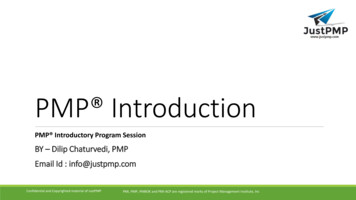
Transcription
Am I free?Free will vs. determinism
Our topic today is, for the second day in a row, freedom of the will. Moreprecisely, our topic is the relationship between freedom of the will anddeterminism, and a cluster of arguments which seem to show that free will isincompatible with both determinism and indeterminism, and henceimpossible.What is “determinism”?The example of “rolling back history” as an illustration of what determinism implies.It is common to use “determinism” as name for the thesis that we have nofree will. This is the source of much confusion. “Determinism” is the name ofa thesis about the laws of nature, and that is all. It is not a thesis about freewill, or about what we can predict, or anything else.
It is common to use “determinism” as name for the thesis that we have nofree will. This is the source of much confusion. “Determinism” is the name ofa thesis about the laws of nature, and that is all. It is not a thesis about freewill, or about what we can predict, or anything else.The question of the compatibility of free will and determinism is then: can itever be the case that choices A and B are open to you, despite the fact thatthe laws of nature (and the prior state of the universe) are consistent onlywith you doing one of those things?The incompatibilist says ‘No.’ The compatibilist says ‘Yes.’
This gives us three possible views about freedom of the will.freedom of thewill is real, andcompatible withdeterminismfreedom of thewill is real, andincompatible withdeterminismfreedom of the willis an illusionvan Inwagen provides an argument for incompatibilism, and hence againstthe first of these options: the consequence argument.
van Inwagen provides an argument for incompatibilism, and hence againstthe first of these options: the consequence argument.This argument relies on a principle that van Inwagen calls the “no choiceprinciple”:As van Inwagen says, this principle seems intuitively very plausible: “howcould I have a choice about something that is an inevitable consequence ofsomething I have no choice about?”But if this principle is true, we can show — with the assumption of two otherplausible principles — that free will is inconsistent with determinism.
DeterminismOnly one future isconsistent with the stateof the world at a time the laws of nature.The no choice principleIf no one has about choice aboutwhether P, and no one has any choiceabout whether, if P, then Q, then noone has any choice about whether QEach of the additional principles in van Inwagen’s argument says that wehave no choice about something.No one has anychoice aboutevents whichhappened in thedistant past.No one has anychoice aboutwhat the laws ofnature are.Putting these principles together, we can construct an argument for theincompatibility of free will and determinism.To state the consequence argument, let ‘DINOSAUR’ stand for the entire stateof the universe during some time when dinosaurs roamed the earth, and let‘DECISION’ stand for my decision to eat a cheeseburger tonight.
No one has anychoice aboutevents whichhappened in thedistant past.No one has anychoice aboutDINOSAUR.No one has anychoice aboutDECISION.No one has anychoice aboutwhat the laws ofnature are.No one has anychoice about thefact that ifDINOSAUR thenDECISION.DeterminismOnly one future isconsistent with the stateof the world at a time the laws of nature.The laws of nature saythat if DINOSAURhappens, thenDECISION happens.The no choice principleIf no one has about choice aboutwhether P, and no one has any choiceabout whether, if P, then Q, then noone has any choice about whether Q
1. No one has any choice about events whichhappened in the distant past.2. No one has any choice about DINOSAUR.(1)3. Only one future is consistent with the stateof the world at a time the laws of nature.(Determinism)4. The laws of nature say that if DINOSAURhappens, then DECISION happens. (3)5. No one has any choice about what the lawsof nature are.6. No one has any choice about the fact that ifDINOSAUR then DECISION. (4,5)7. If no one has about choice about whether P,and no one has any choice about whether,if P, then Q, then no one has any choiceabout whether ——C. No one has any choice about DECISION.(2,6,7)This argument seems to show thatthe combination of four theses —that we have no choice about thepast, no choice about the laws ofnature, the no choice principle,and determinism — rules out freewill.Since the first three of thesetheses seem quite plausible, theargument seems to show that ifdeterminism is true, there are nofree actions — and hence that freewill is incompatible withdeterminism.
1. No one has any choice about events whichhappened in the distant past.2. No one has any choice about DINOSAUR.(1)3. Only one future is consistent with the stateof the world at a time the laws of nature.(Determinism)4. The laws of nature say that if DINOSAURhappens, then DECISION happens. (3)5. No one has any choice about what the lawsof nature are.6. No one has any choice about the fact that ifDINOSAUR then DECISION. (4,5)7. If no one has about choice about whether P,and no one has any choice about whether,if P, then Q, then no one has any choiceabout whether ——C. No one has any choice about DECISION.(2,6,7)This is a style of argument calledconditional proof. To prove thetruth of a statementif p, then qwe assume p as a premise, andargue from this premise, using onlyother true premises, to q as ourconclusion. If we can construct avalid argument with p some truestatements as premises for q, itfollows that the conditionalstatementif p, then qmust be true. Here p the truth ofdeterminism, and q the denial ofthe existence of free will.
1. No one has any choice about events whichhappened in the distant past.2. No one has any choice about DINOSAUR.(1)3. Only one future is consistent with the stateof the world at a time the laws of nature.(Determinism)4. The laws of nature say that if DINOSAURhappens, then DECISION happens. (3)5. No one has any choice about what the lawsof nature are.6. No one has any choice about the fact that ifDINOSAUR then DECISION. (4,5)7. If no one has about choice about whether P,and no one has any choice about whether,if P, then Q, then no one has any choiceabout whether ——C. No one has any choice about DECISION.(2,6,7)This is similar, though notthe same as, a reductioargument. Like a reductioargument, it is an argumentwhich is not intended toshow the truth of theconclusion. (Van Inwagenbelieves in free will, after all.)But unlike a reductioargument, it is not intendedmainly to show that one ofthe premises is false.Instead it is intended todisplay a connectionbetween one of thepremises and theconclusion - to show that ifthe premise is true, theconclusion must be too.
Before I suggested that there were three possible views about freedom of the will.freedom of thewill is real, andcompatible withdeterminismfreedom of thewill is real, andincompatible withdeterminismfreedom of the willis an illusionvan Inwagen’s argument seems to rule out the first option. The last appearsto be a position of last resort — so let’s look at the possibility that free will isreal, but incompatible with determinism.
Let’s examine this position by way of van Inwagen’s example of Jane’sdecision.We now imagine the current pulse travelingthrough Jane’s brain.
The pulse could go one of two ways. Which way it goes will determinewhether or not Jane speaks. Let’s suppose, with the incompatibilist, thatwhich way it will go is not determined by the the laws of nature thestate of Jane’s brain (or the state of anything else).The key question, now is: is Janefree to decide which way thepulse will go?John, I lied to you aboutAlice.
van Inwagen gives an argument that sheis not. For her to be able to decide whichway the pulse goes, she must dosomething prior to the pulse going oneway rather than another which determinesthat the pulse goes that way. But weknow that she did no such thing, sincethe direction of the pulse wasundetermined. So she cannot decidewhich way the pulse goes and the actionis not free.John, I lied to you aboutAlice.
More generally, the idea is this: if we think about the causalchain leading up to some putatively free action A of Jane’s,then, if A is really free and incompatibilism is true, theremust be some event, E, in this causal chain which is notdetermined by prior events plus the laws of nature. Further,it seems that for A to be free, Jane must have had a choiceabout whether E happened. But it is hard to see how Janecould have had a choice about whether E happened, sincethe entire state of the universe prior to E, includingeverything Jane does and thinks, is consistent both with Ehappening and with E not happening. But then it was notup to Jane whether E happened at all.
This argument seems to lead tosome principle like the following:If nothing determines whether someonechooses A or B, the choice of A or B israndom, and hence not a free choice.If any principle of this sort is true, this is serioustrouble for the incompatibilist who wants to believein free will. After all, this sort of principle seems toshow that free will requires determinism — or atleast requires that human actions be determined.
This is, however, hard to swallow, for at leasttwo reasons.First, it seems that moral responsibility requires free will— and it does seem that we are at least sometimesresponsible for our actions.Second, it is just hard to believe that it is not up to mewhether I am going to scratch my nose in a fewseconds.Let’s consider a style of argument which issometimes used to defend the idea that,contra the consequence argument, free willis compatible with determinism.
These are due to the contemporaryphilosopher Harry Frankfurt.“Suppose someone — Black, let us say — wants Jones to perform acertain action. Black is prepared to go to considerable lengths to gethis way, but he prefers to avoid showing his hand unnecessarily. Sohe waits until Jones is about to make up his mind what to do, anddoes nothing unless it is clear to him (Black is an excellent judge ofsuch things) that Jones is going to decide to do something otherthan what he wants him to do. If it does become clear that Jones isgoing to decide to do something else, Black takes effective steps toensure that Jones decides to do, and that he does do, what he wantshim to do .Now suppose that Black never has to show his hand because Jones,for reasons of his own, decides to perform and does perform thevery action Black wants him to perform. In that case, it seems clear,Jones will bear precisely the same moral responsibility for what hedoes as he would have borne is Black had not been ready to takesteps to ensure that he do it. It would be quite unreasonable toexcuse Jones for his action . on the basis of the fact that he couldnot have done otherwise. This fact played no role at all in leadinghim to act as he did. Indeed, everything happened just as it wouldhave happened without Black's presence in the situation andwithout his readiness to intrude into it.”
Suppose, at time T, that Black decides that he wants Jones on a busout of South Bend by some later time, T 3. He hopes that Jones willget on the bus of his own accord, but, if he doesn’t, plans to force himonto the bus.Now suppose that, at time T 1, Jones is deliberating about whether or not totake a bus out of South Bend. He goes back and forth, but eventually decidesto board the bus.At time T 2, Jones boards a bus leaving South Bend. This seems(certainly, at least, to Jones himself) to be a free action. Since it nevergot to time T 3, Black never had to execute his nefarious plan.But now think about Jones’ decision making at time T 1. At that time, it wasalready determined that Jones would be boarding a bus out of South Bend. Afterall, Jones must either decide to board the bus, or not. In the former case he getson the bus, and in the latter case, Black forces him on the bus, so again he getson the bus. So facts fixed prior to his decision making process determined thathe would get on the bus. Nonetheless, his action of getting on the bus seems tobe a free action.Does this show that, if free will is possible, it is compatible withdeterminism?
freedom of thewill is real, andcompatible withdeterminismExplain how it can be that I have nochoice about p, and no choice about thefact that if p, then q, and yet have achoice about q.Explain how an action can beundetermined without being random,and hence not free.freedom of thewill is real, andincompatible withdeterminismMake sense of Frankfurt’s example; either explainwhy Jones is really not free, or why Jones’s beingfree is not a genuine example of a free actiondetermined by factors outside of the agent’scontrol.Make sense of the fact that it seems soclear that what we will do in the nearfuture is something that we have achoice about.freedom of thewill is an illusionEither deny that anyone is ever morallyresponsible for anything, or explain howmoral responsibility is possible withoutfree will
incompatibility of free will and determinism. Determinism Only one future is consistent with the state of the world at a time the laws of nature. The no choice principle If no one has about choice about whether P, and no one has any choice about whether, if P, then Q, th










